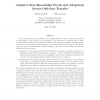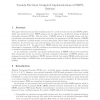54 search results - page 5 / 11 » Oblivious Transfer Based on Physical Unclonable Functions |
PERCOM
2008
ACM
14 years 7 months ago
2008
ACM
We present a tamper-proof and lightweight challenge-response authentication scheme based on 2-level noisy Physically Unclonable Functions (PUF). We present a security reduction, w...
HOST
2009
IEEE
14 years 2 months ago
2009
IEEE
—EDA vendors have proposed a standard for the sharing of IP among vendors to be used in the design and development of IP for FPGAs. Although, we do not propose any attacks, we sh...
TCC
2009
Springer
14 years 8 months ago
2009
Springer
In the setting of secure computation, a set of parties wish to securely compute some function of their inputs, in the presence of an adversary. The adversary in question may be st...
EUROCRYPT
1999
Springer
13 years 11 months ago
1999
Springer
We consider the problem of basing Oblivious Transfer (OT) and Bit Commitment (BC), with information theoretic security, on seemingly weaker primitives. We introduce a general model...
WISTP
2010
Springer
14 years 2 months ago
2010
Springer
ct This paper discusses the practical implementation of a novel security tool termed SIMPL system, which was introduced in [1]. SIMPL systems can be regarded as a public key versio...



